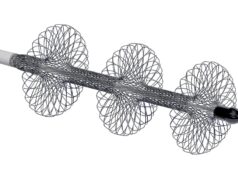
Thomas Haldis (Sanford Health, Fargo, USA) and others report in EuroIntervention that interventional cardiologists, as “neurocardiologists”, can be trained to perform mechanical thrombectomy safely and effectively for the management of acute ischaemic stroke. However, they caution that “robust training programmes and stringent quality assurance programmes” need to be in place before the practice can be widely adopted.
The authors comment that mechanical thrombectomy for the treatment of acute ischaemic stroke is now supported by “level 1 evidence”. They add that although neurointerventionalists are the main operators of mechanical thrombectomy, there are not enough of them to meet the demand for the procedure. “While there is only one cerebrovascular neurosurgery programme in our region, there are nine established ST-segment elevation myocardial infarction (STEMI) programmes. To address this short coming, we believe the established STEMI infrastructure may serve as a bridge,” Haldis et al comment.
According to the authors, they adopted a structured approach for training interventional cardiologists to become “neurocardiologists” and to have the ability to perform mechanical thrombectomy. The approach included teaching clinical assessment of a patient in the emergency room, interpretation of imaging and clinical data, decision-making skills as they relate to thrombectomy, and the performance of thrombectomy itself. Haldis et al report: “Trainees are required to attend stroke codes, spend time with stroke neurology, diagnostic neuroradiology, cerebrovascular neurosurgery, and to see patients postop in the neuro intensive care unit for a period of six months.” They add that the trainees were only cleared to perform mechanical thrombectomy independently, following a period of performing procedures under supervision, after a cerebral neurosurgeon gave their approval for them to do so.
Feasability study
In a study, 15 patients underwent mechanical thrombectomy performed by a neurocardiologist (after they had undergone the training described above). Haldis et al comment: “According to guidelines published in the Journal of Neuro Interventional Surgery, a successful operator should be able to achieve successful recanalisation in at least 60% of cases, to have a symptomatic intracranial haemorrhage rate of less than 10% and for embolisation to new territory to occur in fewer than 15% of cases. Our newly trained neurocardiologists met each of these requirements.”
The authors conclude their findings are “evidence that the technical skills necessary to perform coronary intervention are transferable to the cerebral vasculature”. “For interventional cardiologists who are inexperienced in the treatment of cerebrovascular disease, appropriate preparation and training with a team approach that includes an experienced cerebrovascular neurosurgeon and stroke and stroke neurologist is necessary before attempting mechanical thrombectomy,” they add.
Final thoughts
However, Haldis et al do stress that they believe that “it best for stroke patients to be treated in a dedicated stroke centre”. They further comment: “In addition to proper training for neurocardiologists, it is critical that a stroke centre have onsite expertise in vascular neurology and neuro critical care. As such, we feel it is critical that patients be treated in a centre that has 24-hour access to angiography suites suitably equipped to treat stroke patients and handle the complications.”
Haldis told Cardiovascular News: “Stroke intervention is a different animal altogether compared with coronary work. I felt that my carotid experience was a very good segway. The clinical decision making combined with neuroimaging interpretation are still the most challenging to me, so I always work with a stroke neurologist and radiologist on these cases. Having a complete stroke team at your institution is key.”
For more views on who should be performing mechanical thrombectomy, read Knowledge, experience and training are the calling cards of the mechanical thrombectomy operator on our sister paper NeuroNews.













